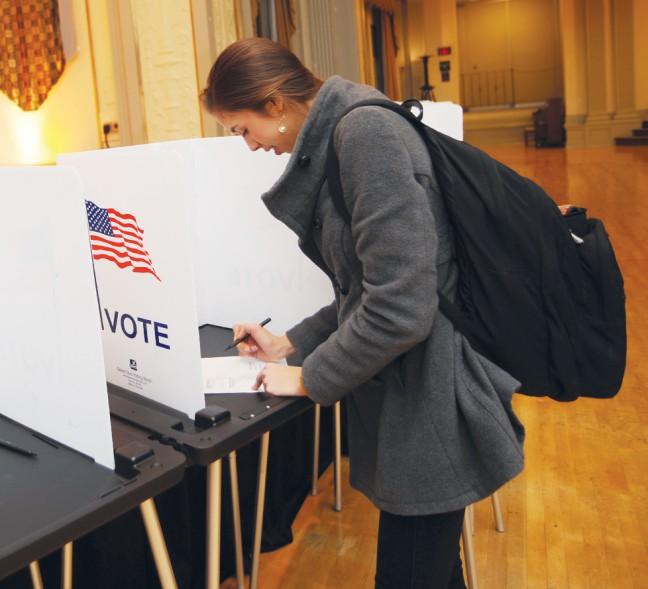Jake Begun’s column “Poor turnout by tenants allows advanced showing by landlords,” (Sept. 7), which laments the lack of students at the most recent City of Madison Housing Committee powwow, and the ensuing defeat of a sensible legislative proposal that would have pushed the start rental season back several months was correct in its overarching conclusion: the outcome of the most recent vote certainly was disappointing.
Begun makes the curious claim, however, that “there really is no one to blame” for this vote. While we can’t know for certain that a strong student presence would have changed the results of the committee’s recommendation, both Begun’s column and the quotes from Ald. Bridget Maniaci, District 2, in the associated news story suggest that student testimony that night would have changed the dynamic of the discussion, if not the vote total. The lack of a student presence at meetings of decision makers and subsequent negative outcomes for students is not a new story; one can go through the archives of this paper and find it repeated year after year, in a multitude of settings. It therefore seems imperative not to shrug our shoulders and chalk it up to “shit happens.” We need to find the persons or circumstances to blame, not so we can demand a penance, but so we can start to avoid these failures in the future.
I believe there is plenty of blame to go around, and will examine it in alphabetical order.
ASM certainly failed here, and I believe that was an undertone of Begun’s column. (As a former ASM representative, I am perhaps overly sensitive to anti-ASM biases in the press, real or perceived, and the blame here goes beyond ASM). Regardless, it is important to understand how ASM failed in this instance. The City of Madison posts its weekly meeting schedule online, and Brenda Konkel and Kristin Czubkowski digest the schedule and post the highlights of each committee on their blogs each week. Furthermore, the Housing Committee meets on a regular schedule of the first Wednesday of the month, and ASM knew that the ordinance would likely appear at the September meeting. ASM has a web browser and a calendar, so the Housing Committee meeting should not have been a surprise.
ASM has made more involvement at the city government level a strategic direction for the organization, but, as it has discovered, the city operates 12 months of the year. ASM overall is woefully understaffed for May, June, July, and August and if it expects to be a credible player in the city, it needs to address how it will be able to function while most of the rest of the organization is operating in a reduced mode.
The Badger Herald shares some of the blame, along with other media outlets. Reporting on the news after the fact is of limited utility, and the Herald needs to decide if it wants to tell students how events unfolded, or give them the information they need to shape events. The Herald knew the Housing Committee was going to meet – it sent staff to cover the event. The Herald may not have been in print, but its website, Twitter feed, and Facebook page all functioned, and a short story noting that the Housing Committee was going to meet and what was at stake would have at least alerted some students – likely the students who were most inclined to actually go and testify.
Alder Maniaci shares a good portion of the blame, along with Ald. Bryon Eagon, District 8, and Ald. Mike Verveer, District 4 – the three whom UW students look to as “their” representatives. Maniaci is the primary sponsor and shepherd of the ordinance, and it has been at the heart of her efforts to help UW students. So, when her legislative priority was up for a crucial vote, and her strategy for passing it relies on an outpouring of testimony from a constituency, it completely baffles me that she didn’t make an all-out effort to ensure that the constituency shows up. Yet, that’s what happened – there was no contact made ahead of time to ASM to coordinate any sort of turn-out, save for a chance encounter with the ASM Chair and Chief of Staff a few hours before the meeting at lunch.
I place some of the blame on Alders Eagon and Verveer because they know the process, the timelines involved, the importance of the issue to their constituents, and the avenues of contact for mobilizing students and they didn’t sound the alarm either. Successful representation requires not just speaking for your constituents, but knowing how to rally your constituents so they can speak with their own voice. Current and future Alders would do well to remember that.
Finally, some of the blame lies with those of us who are paying attention but either didn’t check with others to ensure that some action was being taken, or go out and take action ourselves. I’ve stayed in touch with ASM this past summer pointing out things that are important, and I knew the Housing Committee was meeting, but yet I didn’t send an email or head out to the meeting that night. I’m sure I’m not the only downtown resident who was in the same position. Perhaps we could have made a difference.
I will end this letter like Begun ended his piece: with the hope that things turn out differently at the Common Council meeting later this month. What I hope I have also provided is a framework to ensure that it does.
Erik Paulson ([email protected]) is a graduate student in computer sciences











